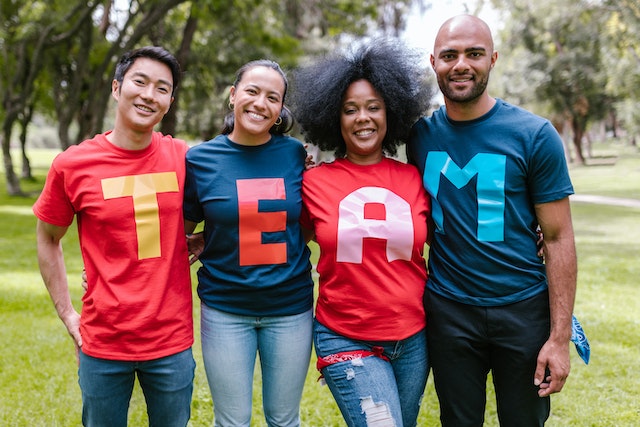How to Build and Maintain relationships: 10 Easy, Practical Tips
Are you struggling to build and maintain meaningful relationships in today’s fast-paced and digitally-driven world?
You’re not alone.
As humans, relationships are a critical part of our lives. Whether personal or professional.
But with so many distractions and demands on our time, developing and sustaining meaningful connections can be challenging.
But in this blog post, you’ll learn practical tips and strategies on how to build and maintain relationships that will not only enrich your life but also help you achieve success.
But before we get started, let’s answer this simple but mind-boggling question:
Why Is It Important To Build Good Relationships With Others?
Building good relationships with others is important because it can enhance one’s sense of well-being, create a support system during challenging times, increase opportunities for personal and professional growth, and lead to a more harmonious and collaborative society.
Interestingly, that aligns with the fact that human beings are social creatures and thrive on connection and belongingness. Building good relationships with others can lead to a greater sense of happiness and fulfillment in life.
How to Build and Maintain Relationships
Now you know that building and maintaining relationships is essential for our personal and professional lives.
But building and maintaining relationships involves time and work that incorporates the following in the process: focusing on effective communication, active listening, mutual respect, showing appreciation, and making time for one another.
That said, here are 10 tips on how to build and maintain relationships:
#1. Effective Relationship Communication
When you want to have good relationships with people (in your life), you need to talk with them clearly and honestly. And that also entails listening carefully to what they say so you can understand them better.
In other words, it’s not about sharing your thoughts and feelings alone. It’s also vital to be interested in people and how they feel. And that is what effective communication is about; making it essential for building strong relationships with people around you.
For example, if your friend gets upset at something, you can find out why he feels that way. And you can do that by listening carefully to what your friend is saying and trying to grasp his feeling.
Also, by sharing your thoughts and feelings, you can show that you care (about your friend) and want to support him.
With such an approach to communication, you can avoid conflicts and baseless arguments in any relationship. And by talking with others respectfully and honestly, you can create positive and meaningful relationships.
And in turn, you can lead to greater happiness and success in all areas of life, such as school, home, or work.
2. Building Trust Together
Can one build strong relationships in all aspects of life without requiring trust as a foundation?
I doubt it.
When there’s trust in any relationship, parties can count on each other and be honest in their dealings. For example, when you keep your promises and follow (through on) what you say, you show that you are reliable.
And that can help you build stronger and more meaningful relationships. Because betraying someone’s trust can damage a relationship. So it’s crucial to be mindful of this and prioritize honesty and reliability.
In essence, having trust in our relationships is like building a bridge between two people.
For example, imagine a seven-old girl whose mom promised to take her to the park on Saturday. She gets all excited and looks forward to it all week. But then Saturday comes, and her mom says she can’t take her because she’s too busy.
She most likely would feel disappointed and sad. But if her mom keeps her promise and takes her to the park as planned, she feels happy and excited.
In other words, when we keep our promises and are honest with others, we can build stronger and more meaningful relationships.
3. Place Premium on Respect
In every friendship, it’s critical to be loving and kind to others. What we often call “respect.” Even when you don’t agree with someone, you should still be kind and listen to what they (have to) say.
It’s okay to have different opinions from others. But we should always try to understand how others feel. Instead of being mean or rude, we should be nice and show that we care about them.
Consequently, when we treat others with respect, we can build stronger friendships and trust each other more. It might be tough sometimes, but by being more intentional in treating people with respect, you can have better relationships at home and school.
4. Invest & Value Time
One of the ways to tell people that you care about them is the quality of time you set aside and spend with them.
And, of course, that is essential to building good relationships.
Investing time in any relationship means doing things (together) with the other party based on mutual interest. It also involves being there for them when they need you.
On that note, you must create time for the people in your life and show them that you value them.
Meanwhile, it requires some work to build and keep relationships. But it’s worth it because having close connections with others can make you feel happy and satisfied.
5. Expressing Gratitude Sincerely
If you want to build strong relationships, you must show appreciation for what others do for you. When someone is kind or helpful to you, it’s good to say “thank you” and let them know you appreciate them.
And often, that can make the other person feel good and encourage them to continue being helpful or kind to you (in the future).
So it’s vital to show gratitude and appreciation for the people in your life, whether they’re your family, friends, or colleagues. Because small acts of kindness, like saying “thank you,” can help to build strong and meaningful relationships with others.
6. Forgive and Apologize
As someone who desires to build solid relationships, you must learn the virtue of forgiveness. Sometimes, people may do things that hurt you. But holding onto that anger can damage the relationship.
So it’s essential to learn to forgive and move forward. Well, that doesn’t mean you completely forget what happened. But it does mean letting go of the negative feelings associated with it.
Also, forgiving others is crucial, and so is apologizing. Especially when you make mistakes that hurt others. In such situations, saying sorry and putting things right shows you care about the other person and value the relationship.
Therefore, learning to forgive and apologize can help you build stronger and more meaningful relationships. Take two friends, Teresa and Lucy, who had a serious and heartbreaking argument.
Lucy had said something hurtful to Teresa, who felt upset and angry. But instead of holding a grudge and damaging their friendship, Teresa called Lucy and explained how her words had hurt her.
Lucy apologized, and Teresa also apologized for any hurtful things she had said. They forgive each other, decided to move forward, and put the argument behind them.
But through a forgiving spirit and apologizing, they maintained a strong and meaningful friendship.
7. Respectful Boundaries Set
If you want to build strong relationships, it’s critical to set boundaries and respect those of others, too. And that means understanding what you are and can’t tolerate and being clear about it with others.
Also, it means respecting the other person’s boundaries and not pushing them beyond their comfort level. As such, setting and respecting boundaries can help you build trust and respect in your relationships.
Additionally, it ensures that you and the other person feel comfortable and safe. I mean, healthy relationships are built on mutual understanding and respect.
Take the incident that happened to two friends.
Lisa and Tom had plans to meet (up) for dinner, but Tom canceled at the last minute due to work.
So later that night, Tom asked Lisa to come (over) to his place to hang out. Lisa declined, as it was late and she needed rest.
Tom was initially upset, but Lisa explained her boundaries and the importance of respecting them. Eventually, Tom understood and respected Lisa’s decision.
So you can say setting clear boundaries and respecting each other’s boundaries helped Lisa and Tom maintain a healthy and respectful relationship.
8. Be Consistently Reliable
If you want to be good friends with someone, you must always do what you say you will do. And that means keeping your promises and being honest.
When you are consistent, people around you (begin to) see you as someone they can trust. And, of course, people will be more likely to want to be friends with you if they know they can count on you.
In other words, try your best to be reliable and keep your promises, even though it’s difficult. But, in the long run, that will help you build strong and long-lasting friendships with others.
9. Embrace Flexible Attitude
Also, you need to be flexible and willing to change to make others happy in a relationship. But don’t confuse it with people-pleasing behavior.
And a flexible attitude includes listening to what others want and adjusting to their needs and preferences after due consideration.
Yes, as someone open to change, you can build better relationships with others and show them that you care about them.
So, by always trying to be open and adaptable to what others need, you’ll be on your way to building stronger and more meaningful relationships!
10. Practice Relationship Patience
Making friends and keeping them can be hard sometimes. And it can take a lot of effort and time to build strong relationships with others.
It’s vital to remember that this isn’t always easy, and it might take a while.
That’s why you need to be patient with yourself and with the other person. Don’t give up if it feels like it’s taking too long. Building strong relationships takes time and patience. Just keep trying, and things will get better over time.
Final Thought
To wrap up this blog post, know that building and maintaining relationships require communication, trust, respect, time, effort, appreciation, forgiveness, boundaries, consistency, flexibility, and patience.
So by following these tips, you can develop healthy and fulfilling relationships that last a lifetime.
Again, remember that relationships are a two-way street, so you shouldn’t forget to actively listen, empathize, and be willing to compromise to strengthen your connections with others.








